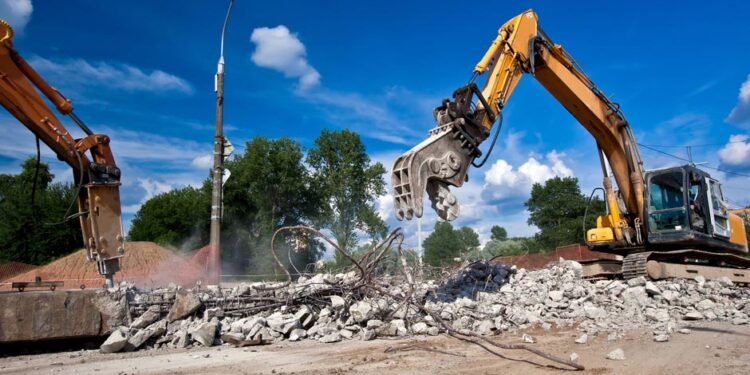Commercial demolition services are crucial for revitalizing urban spaces, renovating older structures, and making way for new developments, and hydro demolition services offer a more precise, environmentally friendly option for these tasks. These services play a vital role in the construction industry, from small-scale renovations to large-scale demolitions. We will explore the critical aspects of commercial demolition services, including their benefits, methods, safety measures, and environmental considerations.
Unpacking the Essentials of Commercial Demolition Services
Benefits of Commercial Demolition Services
Commercial demolition services offer numerous benefits to property owners, developers, and communities. First, they enable the removal of unsafe or obsolete structures, reducing the risk of accidents and liabilities. Second, demolition services create opportunities for new construction projects, stimulating economic growth and job creation in the process. Third, by clearing out old buildings, these services also contribute to urban revitalization, enhancing the overall aesthetic and functionality of neighborhoods.
Methods of Commercial Demolition
Several methods are employed in commercial demolition, each suited to different types of structures and project requirements. Traditional demolition involves using heavy machinery such as excavators and wrecking balls to dismantle buildings piece by piece. This method is effective for larger structures but may be time-consuming and generate significant amounts of debris. Controlled demolition, on the other hand, utilizes explosives or specialized equipment to bring down buildings in a controlled manner, minimizing collateral damage and speeding up the process.
Safety Measures in Commercial Demolition
Safety is paramount in commercial demolition projects. Demolition companies adhere to strict safety protocols to protect workers, bystanders, and surrounding properties. This includes conducting thorough site inspections, implementing barricades and safety barriers, using personal protective equipment (PPE), and following established demolition procedures. Training programs and certifications ensure that demolition professionals are well-equipped to safely handle hazardous materials and operate machinery.
Environmental Considerations
Environmental sustainability is a growing concern in the construction industry, and commercial demolition services are no exception. Demolition companies strive to minimize environmental impact by recycling and salvaging materials whenever possible. This includes metals, concrete, wood, and other materials that can be repurposed or reused in future projects. Proper waste management and disposal procedures are also crucial to prevent pollution and comply with environmental regulations.
Cost Factors and Planning
The cost of commercial demolition services varies depending on factors such as the size and complexity of the project, the demolition method used, site accessibility, environmental considerations, and regulatory requirements. Planning is essential to ensure the demolition process is efficient, cost-effective, and compliant with all relevant regulations. This includes obtaining permits, conducting environmental assessments, coordinating with utility providers, and developing a detailed demolition plan.
Choosing a Reliable Demolition Contractor
Selecting the right demolition contractor is vital to the success of a commercial demolition project. Considerations include the contractor’s experience, expertise, reputation, safety record, insurance coverage, and compliance with industry standards and regulations. Before making a decision, it’s essential to conduct thorough research, obtain multiple quotes, and review past projects. Bruce Johnson Construction is a demolition company prioritizes safety, efficiency, and environmental responsibility.
Case Studies: Successful Commercial Demolition Projects
Examining successful commercial demolition projects provides valuable insights into best practices and innovative approaches. Case studies highlight the challenges faced, strategies employed, and outcomes achieved in real-world demolition scenarios. These projects showcase the importance of meticulous planning, stakeholder collaboration, safety protocol adherence, and environmental stewardship in achieving successful demolition outcomes.
The Future of Commercial Demolition
Technological advancements, sustainability initiatives, and evolving industry standards shape the future of commercial demolition services. Emerging trends such as robotic demolition, Building Information Modeling (BIM), and green demolition practices transform how demolitions are carried out. Robotics and automation improve efficiency and safety, while BIM facilitates accurate planning and resource management. Green demolition practices prioritize recycling, reuse, and waste reduction, aligning with sustainable development goals.
Environmental Regulations and Compliance
Compliance with environmental regulations is a fundamental aspect of commercial demolition services. Demolition projects must adhere to local, state, and federal laws regarding air quality, water pollution, hazardous materials management, and waste disposal. Environmental impact assessments and permits are often required before demolition activities can commence. Demolition contractors work closely with regulatory agencies and environmental consultants to ensure that all aspects of the project comply with applicable laws and standards. Failure to comply with regulations can result in fines, project delays, and reputational damage, highlighting the importance of thorough environmental planning and oversight.
Community Engagement and Stakeholder Communication
Effective communication and community engagement are vital components of successful commercial demolition projects. Demolition contractors engage with local communities, government agencies, property owners, and other stakeholders to address concerns, gather input, and ensure transparency throughout demolition. Open dialogue helps build trust, mitigate conflicts, and foster positive relationships, leading to smoother project execution and enhanced public perception. Community engagement may involve public meetings, informational sessions, and outreach efforts to keep stakeholders informed and engaged at every project stage.
Post-Demolition Site Remediation and Development
After demolition activities are completed, site remediation and development are crucial in preparing the land for future use. Remediation involves removing debris, hazardous materials, or contaminants from the site to ensure environmental safety. Site grading, soil stabilization, and erosion control measures may also be implemented to prepare the site for new construction or redevelopment. Collaboration between demolition contractors, environmental specialists, and developers is critical to achieving successful site remediation and preparing the land for its next use phase, whether for commercial, residential, or public purposes.
Commercial demolition services are essential for clearing sites, removing hazardous structures, and facilitating new construction projects. These services offer numerous benefits, including improved safety, economic growth, and urban revitalization. Adherence to safety measures, environmental considerations, careful planning, and selecting the right contractor are crucial elements of successful commercial demolition projects. Embracing technological advancements and sustainable practices will shape the future of the demolition industry, ensuring safe, efficient, and environmentally responsible demolition services.












